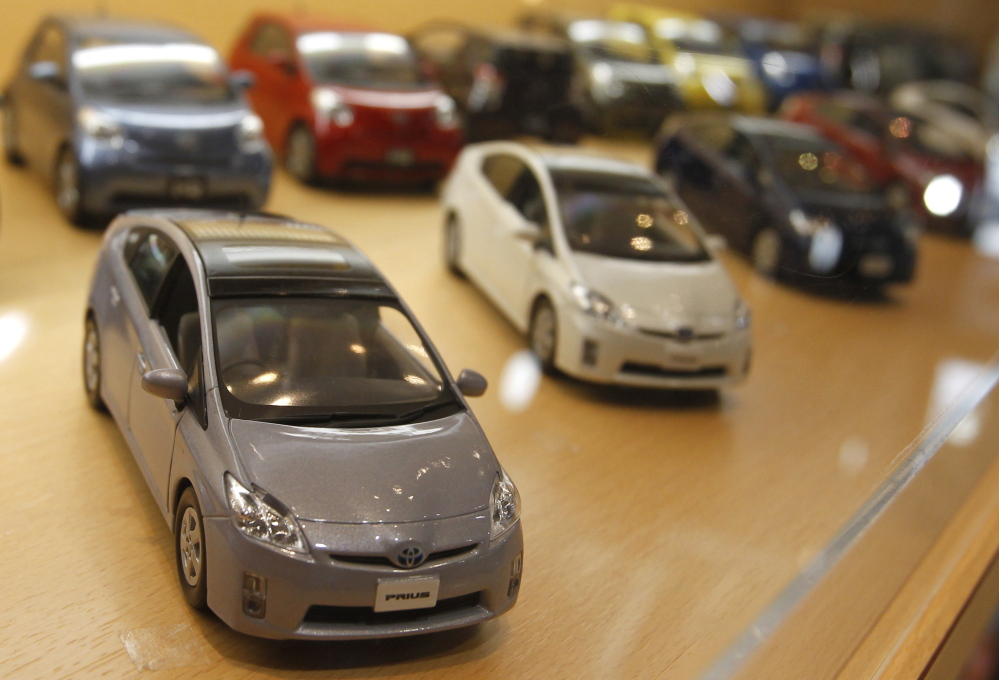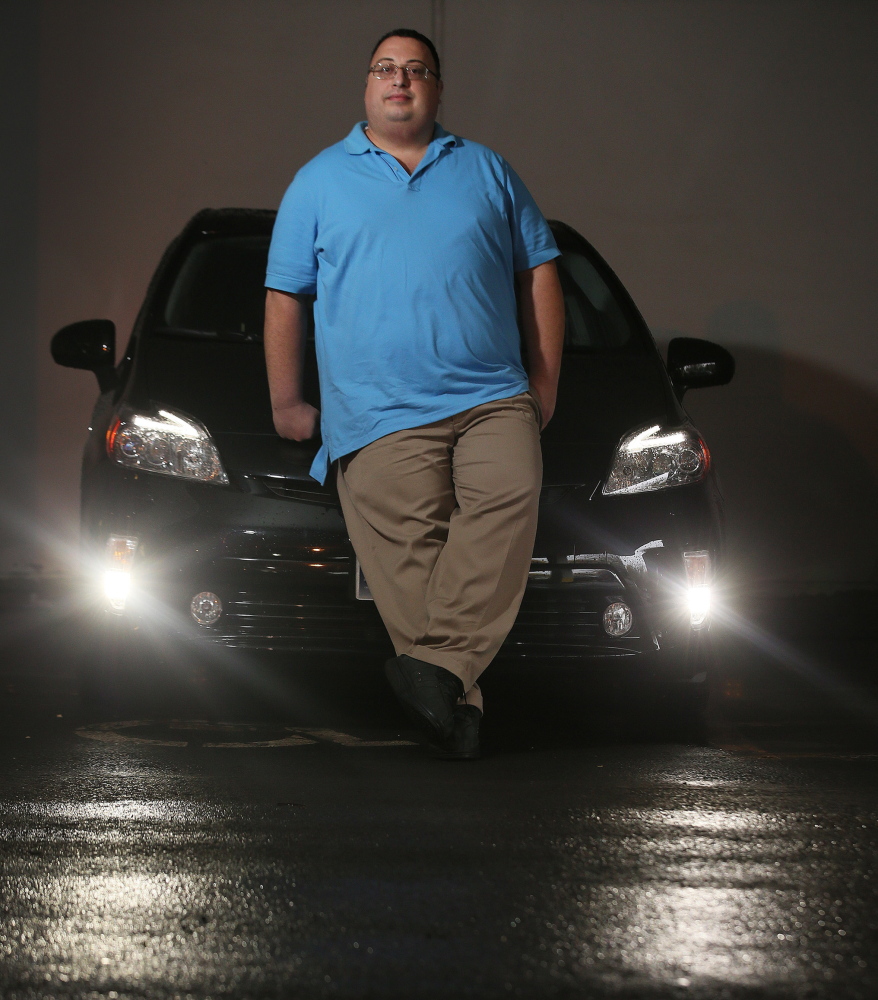When people ask Chris Bellios what he drives, he says it’s a Toyota – a black one.
“The stigma that goes with owning a Prius is palpable,” said Bellios, 43, who loves his Prius so much he’s owned two. Other drivers don’t share his love. “I have never been tailgated so much as I have been with this car. No matter how fast I’m driving.”
Hybrids – vehicles that switch between battery and gasoline power to save on fuel – have been around for 15 years. Yet the vehicles are still failing to win over the hearts and minds of mainstream consumers. Less than 4 percent of all vehicles sold last year were hybrids, and most that are sold are still Priuses.
“Though hybrid vehicles have moved beyond an early adopter audience, they still have a long way to go before they are truly mainstream in terms of industry share,” said Erica Gartsbeyn, Toyota vehicle marketing and communications manager for Prius.
Michael Sivak and Brandon Schoettle, two researchers at the University of Michigan Transportation Research Institute, set out this year to find out why.
They polled more than 1,000 hybrid owners and more than 1,000 nonhybrid owners. Among their findings: One third of nonhybrid drivers said they didn’t even consider buying a hybrid and 61 percent said they weren’t planning to get one for their next vehicle either.
Those surveyed said they either hadn’t considered buying one, thought they were expensive or were concerned about reliability. But when pressed further, 46 percent said there was nothing that could change their mind – even if the vehicle was less expensive, more powerful or had more cargo area.
“We have a big obstacle here. Because it isn’t really on their radar,” Sivak said.
It’s a significant hurdle, considering that hybrids and plug-ins are the only vehicles on the market today that would meet the U.S. Environmental Protection Agency’s 2025 carbon dioxide emissions targets, according to the agency’s fuel economy trends report out this month.
Among those who would never buy a Prius is Daniel Kuczek, who grew up on big American V-8 sedans and likes to tinker with his Buick LeSabre and his Jeep Grand Cherokee. He doesn’t see that happening with a hybrid, he said.
“It’s more like driving an appliance than a car,” said the 53-year-old from Cleveland.
If hybrids have a perception problem, it isn’t because their current owners are unhappy. Hybrid owners surveyed as part of the Michigan study overwhelmingly loved their cars – 93 percent said they’d never had a hybrid-specific problem with their car and 88 percent said they intend to buy one again.
Like the downsized turbo-boosted engines that have become mainstream among drivers who were reticent of the technology at first, “hybrid” and “car” were supposed to be synonymous by now.
Instead, “hybrid” became another word for “Prius.” The car enjoyed more than 50 percent market share among an otherwise splintered hybrid category for more than a decade – plenty of time to pick up a little baggage. In the struggle to make hybrid mainstream, the Prius became a symbol for drivers who wanted to set themselves apart.
Take 42-year-old Keesha Beckford, who wrote on Twitter this month, “If you drive a Prius you shouldn’t be flicking cigarette ashes out of your window. Bits of kale maybe, but not cigarettes.”
In an interview, she told the Chicago Tribune that she associates the car with “self-righteousness and frivolity.” She gets the same feeling of disgust when she sees a Prius, she said, as she does when she sees its gas-guzzling nemesis, the Hummer.
Fox News featured a trend called “rolling coal” – in which diesel vehicles are modified to increase fuel to the engine and emit black smoke – saying that it was, in part, in response to the Prius drivers. In fact, the channel said, it is used as a “Prius repellent.”
It’s also an apparent response to the Obama administration’s fight to lower carbon emissions. Automakers must have a fleetwide average of 54.5 miles per gallon by model year 2025 under the new fuel efficiency standard. Coal rollers said their tricked-out vehicles are a kind of protest against tightening restrictions on carbon.
Meanwhile, Toyota said it’s been working to overcome “stereotypes” about the Prius, including that it is unstylish and that there is just one kind of Prius owner.
One recent TV spot, shows the Plummer family, highlighting a manly firefighter who rides motorcycles talking about how much he loves his Prius.
Other automakers have learned from the trials and tribulations of the Prius. Namely, Ford, which is quickly catching up to Toyota in market share by selling vehicles that are simply hybrid versions of its conventional line.
“There are people who really want to make a statement. But other people don’t really want to make a statement with their vehicle like that,” said Garett Carr, electrification marketing manager for Ford in Dearborn, Michigan. “They just want to do it for intrinsic reasons instead of yelling out to the world.”
Toyota has also delved into new styling in order to diversify the public’s perception of what a Prius looks like. It now offers two Prius models beyond the standard (one has more cargo room, another is a compact that’s more “fun”). In some markets the Prius can be ordered with larger wheels to look more aggressive. The new models, the company said, led to a “surge” in new Prius drivers.
Brent Mix, a 35-year-old adjunct professor of English, is the kind of father who uses biodegradable dog poop bags, but he says being “green” wasn’t a motivating factor for buying his Prius in 2007.
“I honestly liked the way that it drove – that quiet, golf-cartlike car. It had plenty of power for urban driving but I could also save on gas money,” he said.
According to the University of Michigan study, environmental impact is more important for female drivers than males (38 percent versus 29 percent for hybrid owners). The most important factor for men was that the car was less expensive in the long run.
Toyota’s Lexus hybrid SUV has found a niche among moms like Susan Devetski, a primary school principal whose son is in high school.
“They get bigger and their stuff gets bigger and you start carpooling with other people – sports gear, friends, three giant tennis bags, plus their backpacks,” she said.
Until she bought her Lexus, she always felt guilty about driving an SUV.
“Now every time it stops at a stop light and it switches over to electric it just feels so good,” she said.”
Copy the Story LinkSend questions/comments to the editors.




Success. Please wait for the page to reload. If the page does not reload within 5 seconds, please refresh the page.
Enter your email and password to access comments.
Hi, to comment on stories you must . This profile is in addition to your subscription and website login.
Already have a commenting profile? .
Invalid username/password.
Please check your email to confirm and complete your registration.
Only subscribers are eligible to post comments. Please subscribe or login first for digital access. Here’s why.
Use the form below to reset your password. When you've submitted your account email, we will send an email with a reset code.